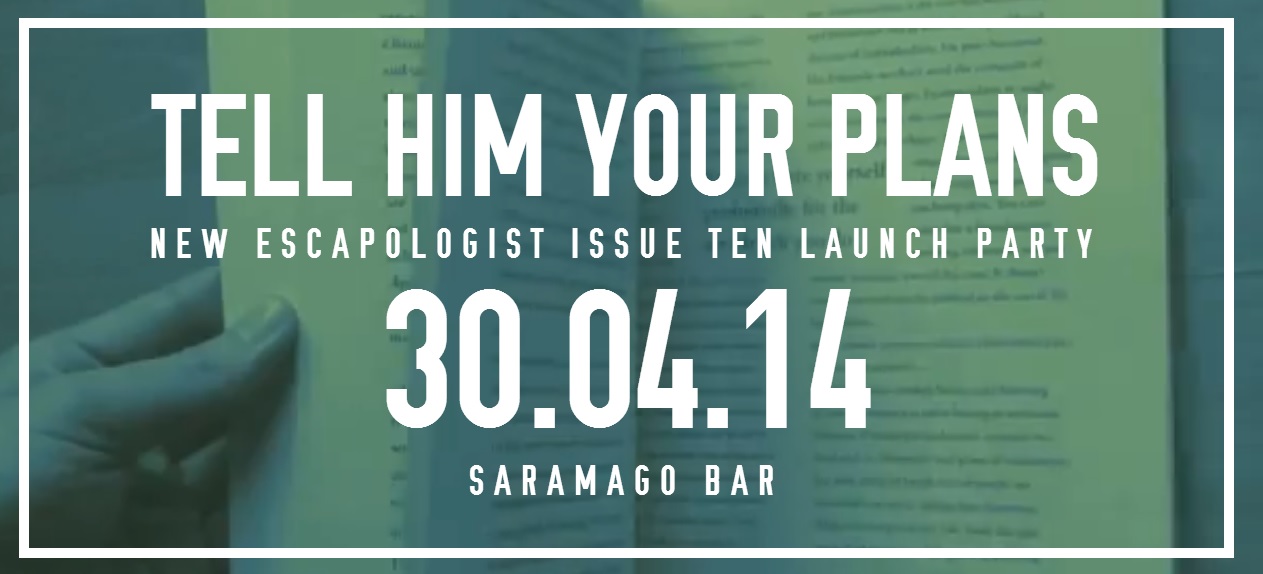Find the Golden Hare
We’re delighted to announce a new real-world stockist of New Escapologist.
Golden Hare Books, Edinburgh. Managed by the effervescent, luminescent Ian Macbeth.
Buy the new Issue Ten in print or PDF today.
Buy the complete back catalogue of New Escapologist with a 10% discount.
Or buy the complete back catalogue on PDF, with £1 off the price each issue.
Issue Ten launch
There’s to be a launch event for our milestone Tenth Issue at the Saramago bar at the Glasgow CCA on April 30th. Welcome all.
Click here to see the rather splendid invitation.
Facebook event page here.
The North American launch will be held in Montreal on the same day. We’ll confirm a venue soon.
UPDATE: The Montreal event will take place at Billy Kun from 18:00. Come early! Here’s the event page.
Buy the new Issue Ten in print or PDF today.
Buy the complete back catalogue of New Escapologist with a 10% discount.
Or buy the complete back catalogue on PDF, with £1 off the price each issue.
Yawn
Joseph Ducreux. Self Portrait Yawning.

Buy the new Issue Ten in print or PDF today.
Buy the complete back catalogue of New Escapologist with a 10% discount.
Or buy the complete back catalogue on PDF, with £1 off the price each issue.
Cain’s Mutiny
From David ‘Raptitude‘ Cain’s excellent essay in our now-available tenth edition:
…we all ought to be thinking of our escape from kindergarten on. I wish somebody had pulled me aside and told me that the education system and working culture I’m going to be marched into are places that are ultimately going to need escaping from, because otherwise I’d never quite get a chance to run my life. These institutions may be useful for learning the fundamentals of language and human interaction, but they’re generally inhospitable for the finding and doing of the work that’s most important to you.
I’m convinced now that nobody gets away with settling on work they don’t care about. The nagging banality of having to do irrelevant work five-sevenths of your days is not something that will eventually leave you alone. Nobody ever makes peace with with the ringing of their alarm clock. We either make a calculated escape, or resign to becoming cynical, bored – and worse – dependent on constant entertainment for relief, because our work does little but drain us.
Buy the new Issue Ten in print or PDF today.
Buy the complete back catalogue of New Escapologist with a 10% discount.
Or buy the complete back catalogue on PDF, with £1 off the price each issue.
Briefcase Winkers
At New Escapologist, our sympathies are eternally with commuters: those strap-hanging Neverwherians, forced to bookend their working days being piped around the undersides of major urban conurbations.
Friend Kate directs us to this alternative Tube map. It gives London commuters an idea of what to expect from unfamiliar stations, should they be required to alight at one due to a strike or power outage or if a forgotten packed lunch has caused Inspector Sands to be summoned to the control room.
Click to embiggen.
Buy the new Issue Ten in print or PDF today.
Buy the complete back catalogue of New Escapologist with a 10% discount.
Or buy the complete back catalogue on PDF, with £1 off the price each issue.
I’m not an employee by nature. Nobody is.

I did a fairly lengthy interview about New Escapologist for a student magazine called Mongrel in 2012. Here’s the original text.
1. What inspired the creation of New Escapologist? What was your mindset when conceiving the idea?
It started in about 2007. I liked the idea of starting a magazine because my friends and I weren’t getting published anywhere else. Why work so hard to court the owners of the machinery when you can build your own machinery with relative ease? If you do that successfully, the machine-owners will come to you eventually. And then you can decide whether you’re going to let them play or just laugh in their obsolete Random House faces.
I knew a lot of talented writers and interesting people who would work initially for the love of it. I knew some illustrators, a graphic designer who had produced a quite beautiful magazine himself but hadn’t got past the pilot issue, and I met a fellow who was into fine typography. With friends like these, it all fell together quite easily. I became a kind of William Morris. You know, if William Morris had been a sarcastic, espresso-drinking Mod.
But that’s the magazine – the hardware – and I think you’re asking about the theory of it all – the software. I’d been reading a lot about Anarchist and left-wing Libertarian politics. It struck me – and I know this is hilariously presumptuous – that most people are probably Anarchists or left-wing Libertarians at heart. Nobody wants to be pushed around by politicians or big corporations. We just have varying levels of tolerance for it. So I began to investigate the more autonomous ways in which people have actually lived: I read a great book about the Bohemians of history; a thing about the mischievous Situationist art movement; an incredibly potent and funny book by Tom Hodgkinson called How to be Free; and – perhaps most importantly – a biography of Houdini. Houdini was a kind of conjurer but he was also a satirist: those on-stage escapes were metaphors for how people felt about politics and consumerism and the new technology of the time. Things that were being sold as liberating, labour-saving miracles like frozen food, phonograph recordings, automobiles, and New Imperialism were actually making us completely dependent upon The Corporation and a centralised government. Houdini and the people who went to see him perform could remember a time when we made things for ourselves and didn’t rely on our new masters to provide everything from the top down, and in such a mediocre way. So that’s what we do at New Escapologist: we’re continuing Houdini’s idea that traps – demeaning office work, debt, ubiquitous car ownership – are there to be escaped. Also like Houdini (and unlike so many counter-cultural publications) we want to have a sense of humour and showmanship about it.
2. What prompted you leave your job and embark on your new life as an ‘Escapologist’?
Well, I’d have to put my money where my mouth is. I couldn’t have all of these ideas and write about them and encourage other people to think about them if I didn’t live them wholeheartedly. I’m also just not that interested in being an employee. I’d given it an honest shot because it’s what most people do, and it’s what the careers advisers insist upon, and I didn’t want my parents to disown me. But I’m just not an employee by nature. Who is really? It might seem like the easy option because it’s what most people do, but it’s actually a kind of pragmatism and a kind of stalling tactic with no real end to it. And it’s kind of masochistic isn’t it? I don’t see how anyone can be satisfied as an employee, waiting on pay cheques and humouring idiot managers, and bookending the day by sitting in cramped, leaky buses full of sad lottery players with the sniffles. Not when you could be getting up at noon and working for yourself at something you enjoy.
3. Why did you choose Montreal as your base?
Stewart Lee did a brilliant bit of stand-up about his dislike of emigrants, especially those who flee to former British colonies like Canada in pursuit of “quality of life”. But I’m afraid “quality of life” is, rather embarrassingly, the reason I have to cite. It’s about 60% cheaper to live here than in London. Because of the low overheads, a dubious industry like publishing your own magazine becomes financially viable. You’re not so dependent upon big pay cheques anymore. I also get to live in a foreign country this way with a different culture and language to the one I’m used to. The thought of dying just around the corner from where I was born gives me the shivers. I want to die a centenarian (which statistically won’t happen in England), perhaps gloriously in an airplane crash like a latter-day Icarus, or – preferably – quietly in a foreign bed with an exotic STI.
4. How do you fill your time?
I skive as thoroughly as possible. I’m a very lazy person. I like to hang out in big libraries, reading books for free. I like to walk for stupidly long distances, especially in cities: from urban centres to industrial complexes on the edge of town.
Then I’ll meet friends for drinks. Trite thing to say, but I love beer. Montreal, I was surprised to find, has a huge number of bars which are also microbreweries producing excellent, characterful beer. We tend to think of Britain being good for beer – and it is, but Real Ale feels like a kind of endangered heritage. In Montreal, it’s an active, current thing. If you’re ever in town, I recommend the Imperial Stout at a bar called La mère à boire. It’ll melt your face.
When I’m not getting swigged up and wandering aimlessly around, I’ll be working on a major caper like a book, or tinkering with a smaller folly like an essay or a magazine article or something.
I suppose my activities are characterised by the fact that they’re self-initiated. I don’t look for institutional, big-whoop things to do like enrolling in college classes or joining sports teams. Find your own things to do. Don’t look for other people to plan things for you.
5. Was it hard adapting to your new life?
No. The struggle was always maintaining my old life. I’m not an employee by nature. Nobody is. What’s hard is waking up at 7am, commuting across town in the rain, trying to concentrate on your work from your veal-fattening pen in an open-plan office with phones ringing everywhere and managers striding around self-importantly. Those were the hard things. What I do now is easy-peasy-pudding-and-pie.
When I first came to Montreal, I imagined I’d learn French but that was hard so I gave up. Learning a language as an adult is like trying to build your own house with a spoon. Now I just speak to people in English. But louder.
6. How do you sustain your lifestyle? Is it possible for anyone and everyone?
For a long time, I subsisted on savings: money I’d earned in my days as an employee. By moving to a cheaper place and by rejecting the usual consumer crap, I made that money last for years. Now, I fund my lifestyle by writing and performing. I do stand-up comedy and write books. Showing off and playing around with words are what I always wanted to do anyway, so it’s not really work. I don’t get paid loads of money for what I do: but it’s just about enough to live on.
7. Is this a long-term plan?
It’s open-ended at least. I have no idea where I’ll be in five years time. Hopefully I’ll have built up enough momentum to keep it going indefinitely. Worst case scenario: I’ll have to go back to being an employee, tail between my legs. But so what? I’d have enjoyed a few years of freedom and I’d have some interesting stories to tell at the water cooler. It won’t come to that though. There’s always suicide.
8. What would you say to people who would label you as a work-shy hippie (I don’t hold this view but I expect you have encountered some who have expressed that sentiment in one way or another)?
It’s actually a pretty reasonable assessment. Besides, anything can be made to sound like an insult. “Obsolete Calvinist” for instance.
9. Would you say consumer culture is the one issue that stops people from escaping the mundanity of ‘wage slavery’? If not what is?
It’s not the one issue, but it’s a big one. We go to work so we can pay for stuff, right? But our perception of how much stuff we need is grossly out of whack. Our evolution as a species is partly to blame (wanting ‘more’ makes sense in the natural state and our brains haven’t caught up with the realities of living in an agrarian, advanced capitalist society with a Tesco on every corner), but marketing is to blame too. Some of the world’s most intelligent people dedicate their entire careers to convincing you that you need things that didn’t even exist yesterday. There’s a direct connection between consumption and work: the more you consume, the harder you need to work in order to pay for it. That’s why we call it wage slavery. Consume less, work less.
But it’s not the biggest issue. The biggest issue, I think, is psychological and concerns something Jean-Paul Sartre called Bad Faith. It’s the idea that we deceive ourselves as to the reality of certain situations. Take office life as an example. We all know, really and truly in our secret hearts, that we don’t want to commute to an office every day and stay there, playing computer solitaire for eight hours. Even if we’re genuinely passionate about our careers or the aims of our organisations, we don’t really want to go about it like that. But we tell ourselves that it’s okay, it’s just a stopgap, and – above all – it’s what people do. It’s the natural order of things. But it’s not! We know it’s not. But we tell ourselves that it is. So the ‘one issue’ is in defeating this weird self-denial and facing up to the reality of the situation and doing something about it. The solution might not be to throw it all in: you might just need to negotiate better working conditions with your boss or something, or reduce your hours to a part-time basis.
10. Do you think this kind of lifestyle could theoretically work on a mass scale? Many people would argue that the economy would collapse if society consumed less.
Wee! I love this question. I hope you’re not insulted when I tell you that I’m asked it a lot. The economy is already in a bad state and it didn’t get this way by people being cautious minimalists did it? The economy is the way it is because of greed and financial mismanagement on a grand scale. If everyone was a minimalist, the economy would be smaller, I suppose, in that we’d have a smaller Gross Domestic Product. But a high GDP isn’t a target or even really an indicator of economic good health: it’s just transactional heat. So, no, I don’t think the economy would be in any worse shape than it is today. It could even be better off for it. Small is beautiful. Just like my cock. And, by the way, the economy is a human-made system designed to make life easier: it serves us, we don’t serve it. If we’re running around trying to save it, something has gone fabulously awry.
Buy the new Issue Ten in print or PDF today.
Buy the complete back catalogue of New Escapologist with a 10% discount.
Or buy the complete back catalogue on PDF, with £1 off the price each issue.
I Quit!
If you are contemplating the moment when you finally light that torch and set every bridge ablaze, here are some sources of inspiration.
An amusing tidbit in today’s newspaper reports on some of the entertaining ways people have walked out on their jobs.
My favourite is probably the marching band story, but the one about the sports journalist who seemed to have a breakdown mid-column is enjoyably weird too.
Me? I’d go for a Barbershop Quartet. “This work is baaaaaaaalls.”
If you’ve got funny quitting stories of your own or even just some quitting fantasies, send them in and we’ll print them somewhere in the next New Escapologist.
Buy the new Issue Ten in print or PDF today.
Buy the complete back catalogue of New Escapologist with a 10% discount.
Or buy the complete back catalogue on PDF, with £1 off the price each issue.
Taboo?
There’s no two ways about it. The world needs New Escapologist.
A Manhattan court typist, it’s been found, spent 30 trials typing the words “I hate my job” over and over again.
Many feel it’s a disgrace that someone so unhinged by boredom could have jeopardized the process of justice, but it’s also quite funny.
It’s especially funny for for people who, like the typist, hate their unfulfilling, deskilled jobs.
In the Guardian today, Dawn Foster asks why it’s so taboo for people to admit to feeling this way:
For some bizarre reason, it’s still taboo to admit that most jobs are unspeakably dull. On application forms, it’s anathema to write: “Reason for leaving last job: hated it”, and “Reason for applying for this post: I like money.” The fact that so many people gleefully shared this story shows that many of us, deep down, harbour a suspicion that our jobs aren’t necessarily what we want to be doing for the rest of our lives.
Buy the new Issue Ten in print or PDF today.
Buy the complete back catalogue of New Escapologist with a 10% discount.
Or buy the complete back catalogue on PDF, with £1 off the price each issue.
A Death Films Production
Thanks to Lentus for directing us to this short film by animator Steve Cuts.
Buy the new Issue Ten in print or PDF today.
Buy the complete back catalogue of New Escapologist with a 10% discount.
Or buy the complete back catalogue on PDF, with £1 off the price each issue.






